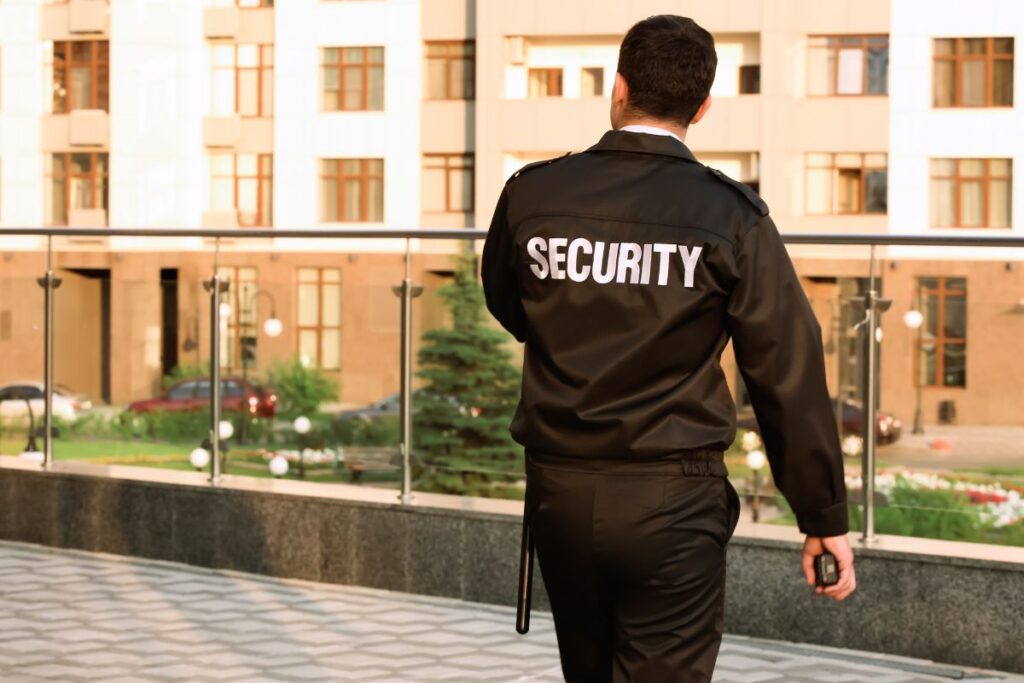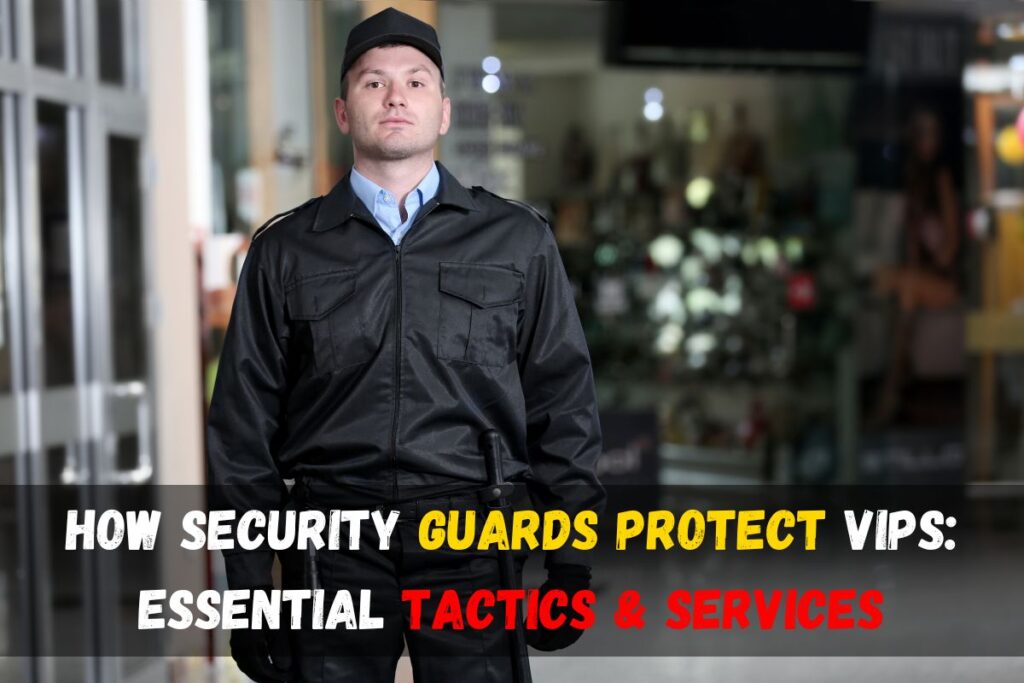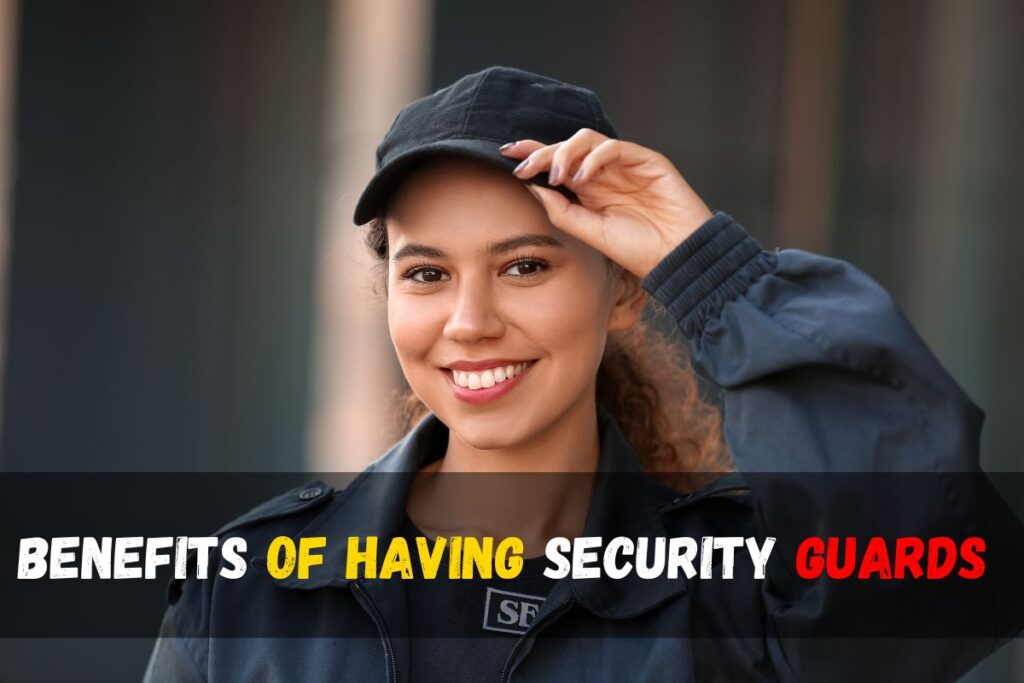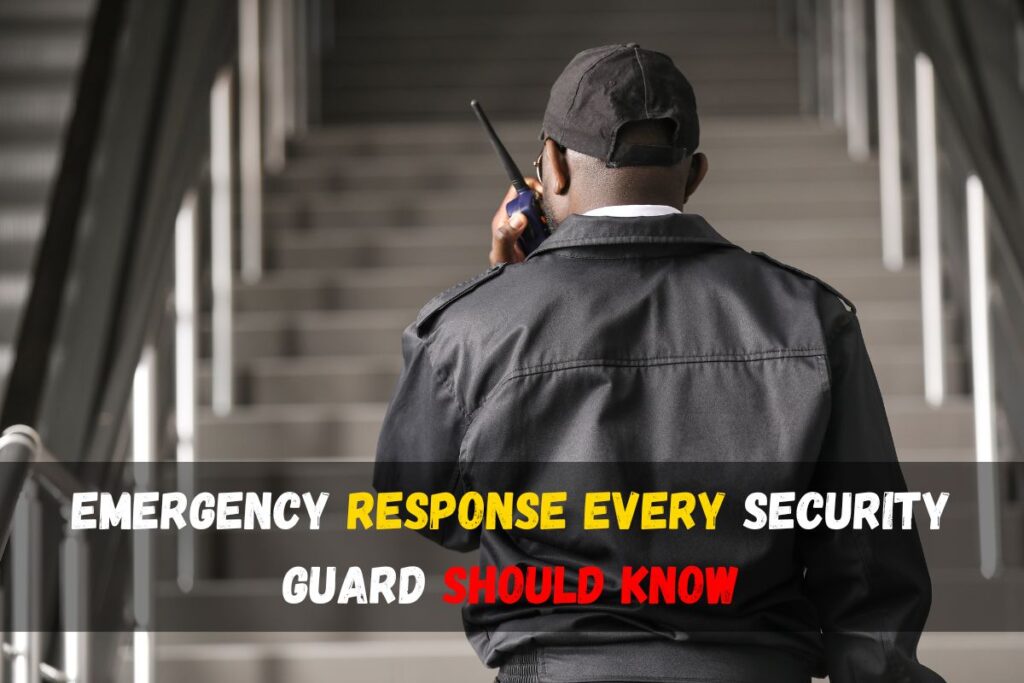The Role of Guards in Educational Institutions

The Role of Guards in Educational Institutions November 12, 2024 Security is a fundamental concern for educational institutions, given the responsibility of ensuring student safety and safeguarding educational assets. Security guards are indispensable in this context, acting as protectors and facilitators who manage threats, maintain order, and promote a secure learning atmosphere. In this article, we’ll delve into the critical roles and responsibilities of security guards in educational environments, highlighting how they contribute to creating safe spaces for learning. Ensuring Safety and Security Security guards are the first line of defense in schools, colleges, and universities. Their primary responsibility is to monitor and control access, preventing unauthorized entry and ensuring only verified individuals gain access to the premises. Positioned strategically at entry points and main building exits, guards perform identity checks, manage visitor entry, and regulate traffic, reducing the chances of intruders compromising safety. In the case of high-risk areas, having dedicated security guards provides not only protection but also peace of mind for students, parents, and faculty. When an emergency occurs, security guards are trained to act swiftly and effectively. They’re equipped with emergency response protocols that help them manage crises like natural disasters, security breaches, or medical incidents. A strong, organized emergency response is crucial in high-pressure situations, and schools with guards who are trained in essential response protocols are better prepared to handle these challenges. Monitoring Surveillance and Security Systems Modern security practices rely heavily on technology, with CCTV systems and security alarms being integral parts of school security setups. Security guards play a crucial role in monitoring these surveillance systems, which allows them to identify and respond to suspicious activities in real time. With advancements in security technology, guards are now equipped with tools that allow them to cover larger areas effectively and enhance overall safety measures. Additionally, by staying vigilant over surveillance feeds, security personnel can detect potential threats like vandalism, theft, or unauthorized gatherings. Guards trained to use these technologies bring added value to educational institutions, as they’re capable of acting on real-time data. This proactive approach helps schools maintain a safe environment and prevent incidents before they escalate. Conducting Routine Patrols Patrolling is a critical aspect of security in educational institutions. Regular patrols allow security guards to monitor various parts of the premises, such as classrooms, playgrounds, hallways, and parking lots. By maintaining a visible presence, guards can deter misbehavior, discourage unauthorized individuals from loitering, and ensure that any issues, like trespassing or bullying, are promptly addressed. Patrolling within the school also helps establish a secure atmosphere where students and teachers feel comfortable, knowing that help is nearby if needed. Schools can gain significant benefits from patrol-trained guards, especially those stationed in high-risk areas. The presence of well-trained guards who are familiar with the campus layout allows for swift responses to incidents, minimizing risks and enhancing the overall security framework of the institution. Crisis Management and First Aid Assistance In emergencies, quick and well-coordinated actions are essential, and security guards are often the first responders to incidents within educational settings. Many guards receive training in basic first aid, enabling them to provide immediate assistance for injuries or medical emergencies until further help arrives. This capability is invaluable, as it helps manage crises more effectively, whether it’s a health-related emergency, an accident on the playground, or an unexpected incident within the classroom. Beyond first aid, security guards trained in emergency response protocols bring a significant advantage to schools. Their ability to handle various crisis situations, including fires, evacuation procedures, and emergency lockdowns, helps create a reliable layer of protection that is essential for educational institutions. Preventing Bullying and Student Conflicts Disciplinary issues such as bullying, fights, or misconduct are common challenges in schools. Security guards are crucial in reducing these occurrences by maintaining order and visibility within the institution. By positioning themselves in high-traffic areas, guards can observe student interactions and quickly intervene in cases of aggression or bullying, contributing to a safe and inclusive school environment. Moreover, the simple presence of a security guard can be a deterrent to harmful behavior. Guards play a role in cultivating respect among students, promoting an atmosphere where students feel comfortable reporting bullying or other issues. This preventative approach to safety is integral to a positive learning environment, ensuring students can focus on their studies without the fear of intimidation. Providing Guidance and Assistance Security guards serve not only as protectors but also as sources of guidance for students, staff, and visitors. Whether it’s offering directions on campus, assisting a lost student, or explaining school policies to visitors, guards often act as the friendly face of the institution. This aspect of their role contributes positively to school culture, making the institution feel more accessible and organized for everyone involved. In schools that prioritize comprehensive security measures, having trained guards dedicated to school security brings an added layer of professionalism to the institution. This commitment to security makes the campus a welcoming and orderly place, enhancing the school’s reputation and instilling confidence in students, parents, and faculty alike. The Impact of Security Guards on Educational Environments Security guards make a profound impact on the educational setting by enhancing overall safety, supporting emergency preparedness, and fostering discipline as role of PSO’s. Their presence reassures parents, students, and faculty, making it clear that the institution prioritizes a secure environment. Schools with well-implemented security guard services demonstrate a commitment to the wellbeing of all campus occupants, promoting a positive reputation and increasing trust within the community. Conclusion The role of security guards in educational institutions is multifaceted and indispensable. From enforcing safety protocols and managing emergencies to deterring misconduct and assisting students, security guards are essential in creating a conducive environment for learning. By investing in professional security services, educational institutions not only protect their physical assets but also support a secure and positive learning atmosphere that benefits students, staff, and visitors alike. Related Posts Understanding the Limits: What Security Guards Can and Cannot Do The Role of Security Guards in
How Security Guards Support VIP and Executive Protection

How Security Guards Support VIP and Executive Protection November 8, 2024 When it comes to safeguarding high-profile individuals, security is paramount. VIPs and executives face unique challenges that require specialized protection measures beyond conventional security services. Security guards skilled in VIP and executive protection ensure a secure environment for these clients, mitigating risks through a blend of proactive strategies, vigilance, and advanced response tactics. Here’s an in-depth look at the critical ways these security experts support VIP and executive protection. Understanding VIP and Executive Protection Needs VIP and executive protection requires an acute understanding of unique security risks faced by high-profile individuals. Unlike general security services, this field demands a tailored approach that aligns with the client’s public visibility, lifestyle, and typical exposure to risk. Security guard services for VIPs and executives often encompass a range of customized solutions, from event security to continuous surveillance, allowing high-profile individuals to operate with peace of mind. The essence of effective VIP protection lies in anticipating potential threats, evaluating vulnerabilities, and being prepared to respond to situations discreetly and efficiently. For comprehensive security options that cater to a variety of needs, explore the services offered by professional security agencies, which are designed to adapt to the unique challenges of VIP and executive protection. Threat Assessment and Risk Management for VIPs Security for VIPs begins long before an event or appearance. Security guards first conduct thorough threat assessments to identify potential risks. This process involves analyzing a range of factors, including the client’s profile, upcoming schedule, and locations of interest, to gain insights into potential vulnerabilities. By understanding the threats unique to each situation, guards can develop a customized strategy that effectively mitigates risks. Threat assessment also involves examining past incidents or patterns that could hint at future dangers. For instance, if a client has faced specific types of threats in the past, security guards might increase vigilance in similar situations or enhance protective measures for particularly high-risk events. Mobile patrol security services often supplement these assessments, ensuring that all access points and surrounding areas are continually monitored for potential risks. Advanced Surveillance Techniques to Ensure Safety In today’s high-stakes security environment, advanced surveillance is essential. Security guards trained in VIP protection employ an array of surveillance techniques, including video monitoring, covert observation, and technology-driven methods to keep a close eye on surroundings. Surveillance is not merely about observing potential threats; it’s also about maintaining a constant state of alertness and being prepared to act at the first sign of trouble. Guards position themselves strategically to cover all angles, blending into the environment to avoid disrupting the client’s activities while remaining vigilant. Additionally, security guards rely on technology to enhance their observational capabilities. By using cameras, sensors, and other monitoring tools, they can track movements around VIPs and detect any suspicious activity instantly. This proactive approach enables security personnel to respond swiftly, securing the area before risks escalate, which is crucial in high-risk settings. Close Protection and Escort Services for High-Profile Individuals Close protection, often referred to as bodyguarding, is a critical component of VIP and executive security. Security guards trained in close protection maintain close proximity to their clients, ensuring they are prepared to respond to threats swiftly and efficiently. This approach not only provides physical protection but also gives VIPs and executives the confidence to carry out their daily activities with peace of mind. Escort services extend this level of protection to client travel, ensuring safe transit from one location to another. Whether the client is traveling to a corporate meeting, public appearance, or private event, security guards coordinate transportation details and escort clients with discretion. For VIPs who move frequently, these services offer a seamless blend of security and convenience, eliminating potential stressors associated with public exposure. To understand more about related services that ensure seamless safety for clients in different environments, explore concierge security options tailored for executive needs. Crowd Management and Access Control at Public Events Public events and appearances for VIPs often attract large crowds, which can increase security risks. In such scenarios, crowd management and access control become essential for maintaining a safe environment. Security guards trained in managing crowds are skilled at directing large groups, setting up barriers, and screening individuals to prevent unauthorized access. These methods are vital for ensuring the client’s safety and preventing situations that could quickly escalate into threats. Effective crowd management is about balancing the need for interaction while maintaining security. VIPs often attend events that require a degree of public engagement, making it essential for security guards to control crowds without causing disruption. Access control further enhances this strategy, as it ensures only authorized personnel can interact with the client directly. This multi-layered approach minimizes security risks and allows VIPs to connect with their audience safely. Crisis and Emergency Response Preparedness Despite the best preventive measures, emergencies can arise unexpectedly. Security guards specializing in VIP protection are highly trained in crisis and emergency response, making them capable of handling medical emergencies, fire hazards, physical confrontations, or other unforeseen situations. In these critical moments, guards rely on their training to de-escalate situations, perform first aid if necessary, and secure the area until additional help arrives. Effective crisis response is about more than just physical protection; it involves making strategic decisions under pressure to minimize harm and ensure the client’s safety. This requires a clear understanding of protocols and an ability to act decisively without hesitation. Having security guards in high-risk areas is not only about protection but about being prepared to manage all types of emergencies with skill and composure. Upholding Confidentiality and Professionalism In addition to physical safety, VIP clients require confidentiality. Security guards entrusted with VIP protection adhere to strict standards of professionalism and discretion, ensuring that all information about the client remains private. Confidentiality is essential when dealing with high-profile individuals, as even small leaks of information can lead to risks. This aspect of security goes beyond physical protection, as guards are often entrusted with sensitive information
Top Benefits of Having Security Guards in High-Risk Areas

Top Benefits of Having Security Guards in High-Risk Areas November 7, 2024 In today’s world, high-risk areas—whether industrial zones, retail centers, or entertainment venues—require comprehensive security measures. Security guards play an essential role in maintaining safety and stability in these environments, where risks such as theft, vandalism, and even violence can be heightened. Businesses operating in such areas benefit greatly from the presence of trained, vigilant guards who serve as both a deterrent to crime and a resource in emergency situations. Below, we explore in detail the many ways that security guards add value to high-risk areas, from improving safety to enhancing customer experience. Explore more about our services here. Crime Deterrence and Proactive Prevention Security guards act as a visible deterrent to criminal behavior, a fundamental need in high-risk areas. When potential criminals see uniformed guards on duty, they are less likely to attempt illegal activities. Security guards provide a proactive form of protection, identifying and addressing suspicious behavior before it escalates into a crime. This form of deterrence is particularly valuable in locations prone to theft, violence, or vandalism. Trained guards remain vigilant and attentive, patrolling frequently and keeping an eye on access points and valuable assets. For example, in high-risk retail zones where theft is common, guards can engage in routine checks and monitor customers closely to prevent shoplifting or vandalism. Businesses can further improve these preventive measures by leveraging technology such as surveillance systems, which guards monitor to identify potential threats. This combination of human presence and technology allows for layered security and reduced risk. Learn about how technology enhances security guard efficiency here. Rapid and Effective Emergency Response One of the greatest benefits of having security guards in high-risk areas is their ability to respond swiftly in emergencies. Security guards are trained to handle crises such as medical incidents, fires, or security breaches, which can be common in high-risk environments. In these situations, a quick and coordinated response can prevent escalation and reduce damage. Security guards are often well-versed in emergency protocols, enabling them to take immediate action that protects both people and property. Consider a scenario in an industrial area where the risk of fire or hazardous material spill is elevated. A trained security guard would immediately notify emergency services, coordinate an evacuation, and assist those in danger. This prompt action not only minimizes harm but also reassures staff and visitors that their safety is prioritized. For an in-depth understanding of these protocols, explore the emergency response procedures every security guard should know. Enhanced Monitoring and Surveillance High-risk areas demand constant surveillance to prevent security breaches. Security guards are essential in this respect, as they monitor surveillance cameras, patrol properties, and inspect access points to ensure safety. This continuous oversight helps deter and catch potential intruders or prevent security incidents. Additionally, guards can use real-time monitoring to spot suspicious behavior or risks and respond before they escalate into more significant issues. For example, security guards in a retail environment can monitor exits and prevent shoplifters from leaving undetected, effectively protecting the business’s assets. They can also inspect the surroundings for potential safety hazards, such as unattended bags or suspicious activity. Businesses can benefit from guards who understand the local threats and work actively to safeguard against them. For insights on retail security threats and mitigation techniques, check out our detailed article on the top security threats in Australian retail. Creating a Safe and Reassuring Environment Security guards contribute significantly to creating a safe environment for employees, customers, and visitors. High-risk areas can be intimidating for those who frequent them, whether for work, shopping, or leisure. The presence of security guards reassures individuals, allowing them to feel safe and focus on their activities. This is particularly crucial in industries like retail and entertainment, where customer experience impacts overall success. For instance, shopping centers in high-crime areas benefit from having security guards on patrol, as it gives shoppers a sense of security. Similarly, employees working late hours or in remote locations feel safer knowing a security presence is nearby. The psychological effect of having security personnel can be invaluable in fostering a secure, welcoming atmosphere, which enhances both employee morale and customer loyalty. Read more about how security guards contribute to corporate environments. Conflict Management and De-escalation Skills Conflict can arise unexpectedly, especially in high-risk areas where tensions may be high. Security guards are trained to handle these situations professionally, using conflict de-escalation techniques that can prevent disputes from turning into dangerous situations. Their skills in managing aggressive behavior, calming upset individuals, and ensuring that disagreements are peacefully resolved make them invaluable in high-stress settings. In places like nightlife venues or busy transit areas, where confrontations are common, security guards play a critical role. By stepping in to mediate conflicts, guards protect the reputation of the business while safeguarding its patrons and staff. Their presence also shows a commitment to safety, which can be a deciding factor for visitors choosing a venue in a high-risk area. For further information on the role of guards in high-risk transport zones, read our article on the role of security guards in airport security. Safeguarding Assets and Property High-risk areas often house valuable assets, from merchandise in retail settings to equipment at construction sites. Security guards serve as a critical line of defense for these high-value assets, providing constant vigilance and reducing the likelihood of theft or damage. Their role extends beyond passive monitoring; security guards proactively manage threats, inspect areas with high-value items, and ensure that only authorized individuals have access. For example, in high-risk warehouses, guards might perform regular inspections and monitor the inventory. By protecting valuable property, guards help businesses avoid substantial losses and costly insurance claims, making their role indispensable in any high-risk location. Additionally, many insurance companies offer reduced premiums to businesses that employ professional security services, providing a financial benefit alongside the enhanced safety. Expert Knowledge of Safety Protocols and Compliance Standards Security guards bring a wealth of knowledge regarding safety standards and
Emergency Response Protocols Every Security Guard Should Know

Emergency Response Protocols Every Security Guard Should Know November 6, 2024 Security guards are often the first to respond in emergency situations, acting quickly to manage chaos, protect individuals, and secure property. Knowing emergency response protocols enables guards to act decisively and appropriately under high-pressure conditions, ensuring public safety and effective crisis management. This guide explores key emergency response protocols, offering insights every security guard should master to handle any emergency professionally. Understanding the Variety of Emergencies Security Guards Face Security guards encounter diverse emergency situations, including fire hazards, medical incidents, security breaches, and natural disasters. Each type of emergency demands a unique response approach, from using fire suppression equipment to providing first aid or coordinating an evacuation. A thorough understanding of these different emergencies allows guards to assess risks, prioritize actions, and effectively guide the people involved to safety. Security guards working in specialized environments, like shopping centers, often face additional responsibilities in crowd management and public safety, making specialized training critical. For more on specialized security services, visit our shopping center security services. Fire Emergency Protocols: Minimizing Damage and Ensuring Safety In the event of a fire, a security guard’s primary duty is to ensure the safety of all building occupants by facilitating an organized evacuation and managing initial firefighting efforts if trained. Fire emergency protocols include pulling the nearest fire alarm, contacting emergency services, and directing people to safe exits. Guards may use fire extinguishers for small, manageable fires but should leave larger fires to professional firefighters. Evacuating disabled or elderly individuals requires careful planning, as does guiding large crowds to prevent panic. Proper documentation of the incident, including details on how the fire started, can provide valuable insights for future prevention and training. Responding to Medical Emergencies with Quick and Effective First Aid Medical emergencies are common and require a prompt and composed response. Guards trained in CPR and basic first aid can assist injured or unwell individuals before paramedics arrive. This process involves assessing the person’s condition, calling emergency services, and providing appropriate first aid. A security guard’s presence and assistance during these critical moments can prevent further complications, offering reassurance and care to those in need. Following up with comprehensive incident reports also aids in tracking recurring issues and improving emergency readiness. For security guards aspiring to broaden their qualifications, training and certifications in Australia provide valuable skills for handling such emergencies. Handling Intrusion or Security Breach Scenarios Intrusions or unauthorized access present a serious threat to safety, requiring security guards to stay vigilant and proactive. When detecting suspicious activity, guards should assess the risk, issue warnings if appropriate, and engage backup if the situation escalates. Securing access points, monitoring surveillance footage, and contacting law enforcement may all be necessary steps. Guards working alongside K-9 units may also benefit from enhanced detection capabilities, particularly in larger facilities or areas with high-security requirements. The role of K-9 units is invaluable for identifying intruders, and for more insight, refer to our article on K-9 units in security guard services. Natural Disasters: Protocols for Crisis Management Natural disasters such as earthquakes, floods, or severe weather events often create chaotic environments, placing high demands on security personnel. Protocols for natural disasters include guiding occupants to designated safe zones, coordinating with facility management on emergency supplies, and staying updated on weather alerts. Effective communication ensures that people understand where to go and what actions to take, reducing the potential for panic. Guards should follow detailed safety plans developed in advance and remain adaptable, as natural disasters may cause sudden changes in risk levels. Analyzing past incidents and refining disaster plans allows security teams to improve response effectiveness over time. Essential Communication Skills During Emergencies Clear, direct communication is central to an effective emergency response. Security guards must communicate calmly and concisely, whether they are guiding individuals during an evacuation or liaising with emergency services. Using radios and intercoms, guards can keep supervisors updated, coordinate with other staff, and provide necessary information to emergency personnel. Training in effective communication enables guards to control crowds, prevent misinformation, and maintain order. Communication protocols can vary depending on location and team size, making it important for security guards to understand the specific requirements of each role. To explore security career paths that emphasize communication skills, visit our guide on skills and qualifications for private investigators. Evacuation Procedures for Security Personnel Evacuations are critical during fires, security breaches, and natural disasters. Security guards must be familiar with building layouts, exits, and safe zones to guide people safely. Evacuation procedures involve clearing high-risk areas, such as stairwells and elevators, and assisting those with mobility challenges. Security guards play a central role in managing crowd flow, preventing panic, and ensuring everyone reaches a secure location. Regular evacuation drills and training enhance guards’ preparedness, reducing response time and minimizing risks. The role of guards in evacuation planning is indispensable for comprehensive crisis management. Incident Reporting and Post-Emergency Analysis After every emergency, detailed incident reporting helps document actions taken, challenges faced, and outcomes achieved. A thorough report includes the event timeline, initial assessment, response measures, and any injuries or damages. Security guards should provide clear, factual details that supervisors and authorities can use to improve future protocols. Conducting post-emergency debriefs allows guards and management to discuss response effectiveness, identify areas for improvement, and update emergency plans accordingly. Regular training and review also enhance team skills, promoting continual improvement in emergency response readiness. For those interested in establishing a security guard business that prioritizes high standards of training and accountability, see our resource on establishing a security guard business in Australia. Legal and Ethical Considerations in Emergency Responses Security guards must navigate legal boundaries during emergencies, ensuring their actions are within the scope of authority. Overstepping can lead to legal complications or liability for both the guard and the company. Guards should understand when to intervene and when to defer to law enforcement or medical personnel. Familiarity with laws governing self-defense, citizen’s arrest, and property protection is essential.


